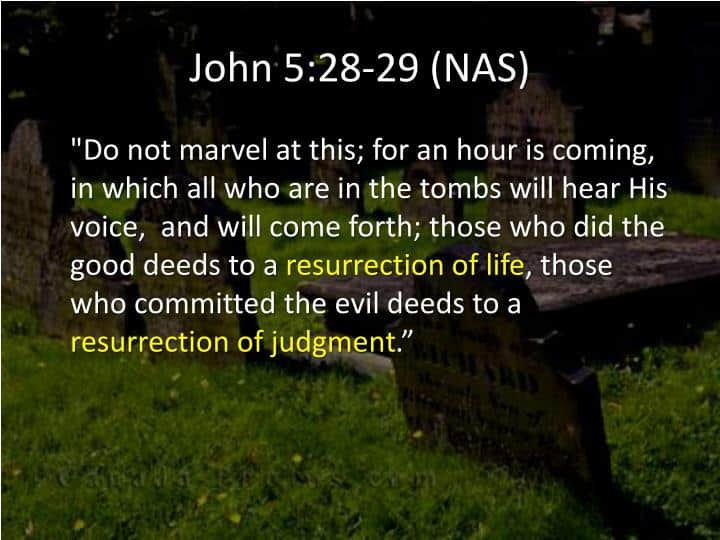So what are believers to take away from this teaching in John 5:28-29, that Christ will assess the works of everyone in the end? For one, we are to live in the sight of God as those who will give an account. Listen to this description in Heb. 4:12 For the word of God is living and active and sharper than any two-edged sword, and piercing as far as the division of soul and spirit, of both joints and marrow, and able to judge the thoughts and intentions of the heart. 13 And there is no creature hidden from His sight, but all things are open and laid bare to the eyes of Him with whom we have to do.
Of course the Son of God possesses the characteristics of the Word of God and in that way, it would be accurate to say that Christ is the one who implements what is spoken of here. So do we actually think he is fooled by a mere profession of faith with no spiritual life associated with it? Can he be deceived by a superficial attachment to the church that is absent of a vital union with him that can only occur through saving faith? This is why sitting under the unadulterated preaching of the word is so important because it cuts right through everything and brings spiritual clarity so that we can know ourselves and know others.
However, that Hebrews text does not give us any proactive instruction, so we will go to another passage, in which Paul teaches the driving force of a Christian’s life in 2 Cor. 5:9 Therefore we also have as our ambition, whether at home or absent, to be pleasing to Him. 10 For we must all appear before the judgment seat of Christ, so that each one may be recompensed for his deeds in the body, according to what he has done, whether good or bad. Paul, a Christian, who clearly understands the gospel, lived his life in view of the judgment. Nevertheless, this is difficult for some to comprehend, which is largely due to our church backgrounds and namely, a faulty understanding of faith. Faith is not evidenced by merely repeating words–“I believe Jesus died on the cross for my sins and rose on the 3rd day.” Nor is faith automatically present when one is baptized or even involved in some way in the church. Those things may or may not involve faith, since faith, by definition, involves entrustment or reliance; a looking away from oneself to placing all hope solely on another. If someone truly entrusts their soul to Christ and is thus in union with Christ and continually abiding in Christ, then there will be a bearing of fruit. None of that invalidates the gospel of grace alone through faith alone. It’s just that there is always a supernatural, obvious effect of being a recipient of the gospel.
However, some still might say: Why should we even worry about this kind of judgment since every believer is not going to end up in Hell anyway? Is that all that we think about as it relates to Christ?—“I’m so glad he rescued me from Hell; that’s enough for me. I’m not going to concern myself with anything else and I’m so thankful he accepts me just the way I am. It’s not that big of a deal if I don’t please him in everything and are those rewards or capacities to know and enjoy him for all eternity really that important? I invited him into my heart when I was 6 years old in that summer camp and I’m just going to leave it at that.” Is that really the heart of a Christian because the Bible is clear that Christians live in the sight of God as those who will give an account.

